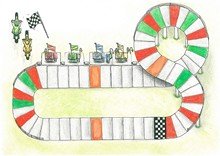Board Game Rules and Social Language Skills
 Board Game Rules: 'You cheated!' The dice was hurled
furiously at the game board. The die was launched with such anger and passion that its momentum caused it to rocket past my head at roughly the speed of light.
Board Game Rules: 'You cheated!' The dice was hurled
furiously at the game board. The die was launched with such anger and passion that its momentum caused it to rocket past my head at roughly the speed of light.
My five year old adversary had been winning Snakes and Ladders until the moment that I got the perfect score, which sky-rocketed me into the lead to win the game. The child understood the board game rules but had yet to develop important social language skills to prevent such blow ups from occurring.
Learning to lose games gracefully is a social language skill which is important for children to learn early on in life. Board games are a wonderful tool to teach those skills. When children play board games often enough and lose as many times as they win,
they develop resiliency. Resiliency is the ability to adjust to a disappointment easily and, in the
case of playing competitive games, not explode in anger when things don't go your way.
Other than learning how to lose, board games help to develop other important social language skills. Playing a board game with peers requires children to cooperate and pay attention to important actions, such as the sequence of play or learning board game rules. When
enjoying a game of, for instance, Junior Pictionary, children need to be able to get along with and communicate with each other
to complete the game.
Turn taking is also an important skill, best learnt early in life. In a relatively simple game of Snakes and Ladders, which
can involve several players, children will often need to wait several minutes for their turn. As the minutes slowly tick by, children need to devote mental resources and attention to keep up with what the other players are doing and the position of their tokens, etc without losing their patience.
Studies indicate that good social language skills have a direct relationship with academic success in school.
Children who develop good social language skills early tend to have better skills in communicating with peers and adults, cooperating, avoiding conflict and being observant of rules.
Children with well developed social language skills
have an easier time at school which translates into successful academic and school life. Board games have an important role to play in
children developing great social language skills that will make school life an enjoyable and rewarding experience.
References
Brathwaite, B & Schreiber, I (2009) Challenges for Game Designers: Non Digital Exercises for Video Games Designers Course Technology CENGAGE Learning
Hinebaugh, J.P. 2009 A Board Game Education: Building Skills for Academic Success Rowman and Littlefield Education
Return from Board Game Rules to Educational Board Games
Enjoy this page? Please pay it forward. Here's how...
Would you prefer to share this page with others by linking to it?
- Click on the HTML link code below.
- Copy and paste it, adding a note of your own, into your blog, a Web page, forums, a blog comment,
your Facebook account, or anywhere that someone would find this page valuable.
|